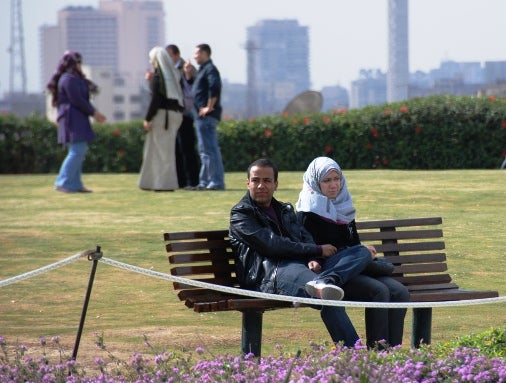 Education and employment are key problems for young people in Egypt, who say they need to see changes—in terms of more jobs and better education—in the present, not in the distant “future”, the word they always hear used in promises of change in Egypt.
Education and employment are key problems for young people in Egypt, who say they need to see changes—in terms of more jobs and better education—in the present, not in the distant “future”, the word they always hear used in promises of change in Egypt.
Take the examples of two young men, Samer and Youssef. I met Samer in Tahrir Square in early 2011 when we joined Egypt’s revolution. A young man in his twenties, his ambitions resembled those of most of his peers. His dream then was to get job. He graduated four years earlier but was still being supported by his widowed mother.
Samer said that although he had applied for many jobs, he realized that other people with even fewer qualifications but more connections were getting jobs while he wasn’t.
“Honestly, I can’t claim to have outstanding qualifications,” he told me. “I was educated in state schools and, because the education wasn’t great, my English is not proficient. But I don’t have the money to take courses in it.”
Samer was still relying financially on his mother at a time when he felt he should have been supporting her. When we spoke in May this year—more than three years later—he was still unemployed. Every time we speak, I can sense his hope for positive change, fading.
My brother Youssef is another example. He waited to graduate from university before applying for a job so that he could begin to earn his own income and stop asking for money from his siblings. Connections, my father told him, would be his key to the job market; my father had managed to get Youssef an internship in a radio and television station—a foot in the door.
A few days after Youssef heard about this promise, however, Youssef got a call from the man who had made it, to say he was sorry but he needed to postpone radio and television internships at the station for a while because all his staff were busy out covering demonstrations, which had erupted again.
Youssef’s complaint is that despite the Egyptian revolution, there have been no real changes or reforms, and no job creation. Nowadays, he tries to fill his time by repeating courses in computer and interpersonal skills, though he no longer sees a practical value of continued learning given limited job opportunities. “I’m fed up with this country that kills us slowly with disappointment,” he said.
Young adults feel worthless in their homeland today, after a revolution in which some of their fellows and friends were killed or injured. In 2011, they had joined the movement for change genuinely hoping for a better time for Egypt in the present—one which would grant everyone in their generation equal access to quality education and the job market, whether they had “connections” or not.
They wanted to transform the Egyptian state into something new—something that would include transparent governance and accountability—a regime that would improve public education so that less privileged students would receive an education that qualified them for the competitive job market too.
The hopes of most of the young men who took part in the revolution, though, have been dashed by the instability that has followed it. The extent of economic deterioration that has taken place in Egypt since the revolution in 2011, has led to fewer jobs—“until the country stabilizes” as people tend to say.
Young people have come to feel that this statement on waiting for stability stands like a wall between them and their prospects of employment. The outcome is a generation of young people full of despair, with no sense of belonging, suffering from feelings of worthlessness.
This made me think of projects, carried out by the World Bank Group in countries like Egypt, that focus on education, governance, youth employment and equality opportunities. Though I know it is up to Egypt to makes the changes—with limits to what the Bank can and can’t do—I can’t help wondering whether we are doing enough for young Egyptians hoping for a better life in the present.


Join the Conversation